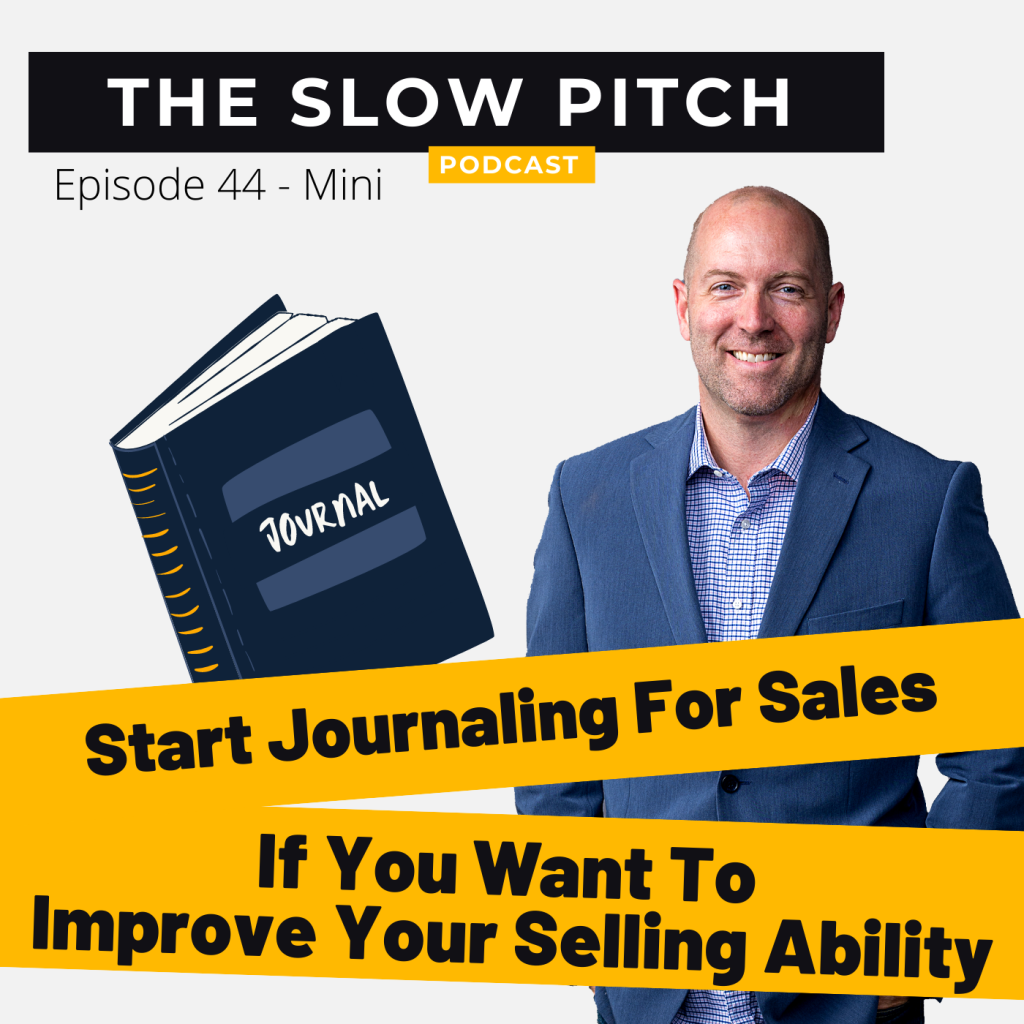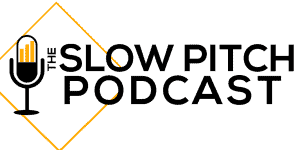Start Journaling To Jumpstart Your Selling (3 Simple Things to Do)


Notes
Journaling For Sales
Journaling for sales is helpful in a lot of ways, but not everyone thinks journaling is for sales. Sales people usually have an attitude that they can do anything and they don’t need to journal. I am here to disagree. If you’re in sales, you should be journaling every day. Twice a day.
In this episode we talk about how Journaling for Sales is as important as learning how to sell. So much of sales is dependent on where you are mentally, how well you are focused on the right things, and listening to the potential buyer. If you’re not listening, you can sell.
That said, if you’re not listening to yourself about what you’ve done right, what you’ve done wrong, how you feel during different parts of the meeting, what you see as possible problems and trip-ups…every aspect of sales and putting that into a journal, you’re missing out.
Don’t have a journal? Don’t worry! You have paper right? Microsoft Word? Evernote? You have what you need. Stop making excuses! 🙂
This episode if for you if you are frustrated after several sales meetings that didn’t close. If you feel like you’re missing critical components of your sales conversations, it’s time to start journaling for sales.
Journaling for sales includes writing out what you did right. Journaling for sales includes writing out what you did wrong. It also includes your mental state, how you feel, how well you took action for the day, and a whole lot more!
To help you with prompts, we’ve attached a Journal Prompts PDF (See Link Above).
Other related episodes:
How To View Failure When Selling (Even When Things Look Grim)
When Should I Stop Calling A Sales Prospect
Sales Calls Gone Wrong and Call Reluctance
Why Can’t I Talk About Money In Sales? (How To Be More Confident)
Music: "Clydesdale Funk" by Cast of Characters, written by: Dustin Ransom.
The Episode
Rob 00:08
Welcome back to The Slow Pitch. And today we’re going to talk about how to journal effectively. And for those of you that have never journaled before, it’ll be an interesting experience. For those of you that think that journaling is not for you, I hate to say it, but you’re actually missing out. Let’s get started.
V/O 00:27
You’re listening to The Slow Pitch Podcast, a podcast about selling less and closing more.
Rob 00:34
Alright, so this episode is about journaling. And while many people think that journaling is for little girls in their diary, I think you’re missing out, I think one of the things that I’ve learned in sales is that some of the thoughts that you might have in your brain, some of the thoughts that you feel are, what you grew up with what you were told, they’re not always, they’re always the right thing. And this is one of those things, believe it or not, journaling can make a huge, huge difference. When I started in sales, I thought it was dumb to to journal, and I was like, I can’t do this. But what I ended up finding out was is when I got stuff on paper, when I got thoughts on paper, and started to use that journal to learn, I learned that I was missing out on something that was having a big impact on sales. Let’s kind of talk through what I mean by journaling, there’s a couple of ways to journal one one way is just good old fashioned pen and paper, right. And you can just write out loud stream, a thought stream of conscious thought, and just let it come out. And we’ll get into the subjects here, what you’re going to journal about, but you can do it with paper and pencil. The other way to do it is you can do it on a computer or an iPad, where you’re typing it all in. And that’s all good, too. There’s some school of thoughts out there that say, if you write your journal with your hand with paper and pencil, pen, whatever, it’s much more effective. But when I did it, I was doing it via the keyboard, on a computer, and sometimes on a an iPad. And those I felt were just as effective as the ones that I hand wrote wrote out, but everybody’s a little different. And then finally there. The other third one that I’ve done and tried and it actually works really well is, in particular for one particular situation, so I’ll get into that in a second as well, but as a video journal, and that’s going to be a little bit creepy for you probably because you’re not supposed to record myself doing this. But quite honestly, you’ll see why in a minute. So let’s get into some of the subjects of what you’re going to what you’re going to journal about.
Rob 02:31
When you’re in sales, you’re kind of by yourself, you’re you’re you’re you’re out there trying to do your best and sometimes it gets really frustrating. And you can get down on yourself. And you can you can really feel like you’re all by yourself, you’ve been beaten up so many times. And now what and you can’t go to your your friends or your other salespeople that are maybe you’re working with or other employees that you work with, and say, Man, I suck, you know, you can’t do that, right. And you can’t have this negative attitude, you can’t, all of those things are true. So this is an outlet for you to not let anybody know what you’re writing about. You can write about whatever you want. And when you do this, it gets it out of your head and on paper. And if you’re if you have something very negative happening, and you just need to get it out of your head, I have found that it’s very interesting to write it all out, to write all this stuff out that you have in your head that’s negative, and then pull that paper off the pad, crumple it up, throw it away, and now it’s gone. You don’t have to worry about anymore. And it sounds weird, but it’s true. It’s something psychological about it is no longer there, it’s out of your head, you’ve put on paper, and that paper is now in the trash can. There’s value in that, whether you like it or not, or whether you believe that or not.
Rob 03:42
Let’s talk about some of the things you can write about. So first things first. Some people suggest writing twice a day, once in the morning, once in the afternoon, some people just do it once a day. All these things are kind of flexible for what you feel is important and helpful for you. But if you do it in the morning and the evening, what happens is you can sit down and write, here’s my goals for the day, here’s what I’m trying to get accomplished today. I’m thankful I’m grateful. Those types of things you can talk about, right? So you can it doesn’t have to be very long, you don’t have long sentences. But you can basically take it and say, Alright, here’s the goal that I have for the day, or here’s what I’m trying to get done today. Or here’s where I want my mind to be today. I want my mind to think about this or keep this in mind when I’m going to the next sale. By doing that. I’m kind of conditioning my brain and conditioning my day of what it’s going to be like and then when I get to the end of the day, and you pull that back up, and you look at it if you had just a very positive things or just like you know, hopeful things, what may end up happening next is you may end up looking at that list and go oh boy, I did everything I thought I was going to get done. And so you could be journaling about I got everything done that I expected to get done. Or you could say I got everything except for these two things done. And the reason I didn’t get these two things done is because I did X instead. Or I put it off because I didn’t feel comfortable doing that. And that’s an interesting whole little nugget for you to work on, right? You’re gonna look at that go, I didn’t feel like you have to kind of admit to yourself, Hey, I didn’t do what I said I was going to do. So there’s value in that you can start to work on your own. What did I not did get done? And what did I put off? And I have to do it again tomorrow, write it out tomorrow. Now you’re running into a situation where you’re like, Okay, now I gotta get this thing done. So there’s value in that part, too. The other thing is, is how are you feeling? What is your on a scale, let’s say on a scale of one to 10, what is your, your whole feeling about the day, your attitude, your way of looking at life way of looking at your day in front of you, or how you looked at your day behind you, once you’re finished? All those things, you could rank and you just literally put in there a number and say, here’s where I feel today, here’s where I’m at. And if you get done with the day, and you say I am not feeling very high on myself here for my getting things done, maybe I need to think about what I’m working on to get done. And how do I break these down into smaller chunks and pieces that actually feel more comfortable. What’s stopping me from getting these things done? Is there a is there a mental problem that I’m having here with this? In other words, like I just don’t want to lift up that phone? Because I’m fearing rejection? What’s causing these things? Those are the sort of these all these things start to do by journaling is it brings it out makes you it kind of forces you to look at it and say, Okay, what can I do to work on that? If you’re not really sure what to do? That’s where you can bring up other friends and people that you know, in the business and say, How do I work on this? What do I need to do? or what have you done to fix this, this type of thing. Those are the simplest things that you can do with a journal.
Rob 06:39
Now let’s talk about the video journal piece. Because this is where, because the other the other you can do on paper or on your computer, iPad, however you want to do it. But if you’re going to do a video one, what is that, where’s the value in that? So here’s what I used to do. And I still do to this day, every once in a while when I when I need it. When it becomes a situation where I feel pretty down on myself or I feel like nothing is happening. Sales aren’t closing things pretty much life in general, in the sales world sucks, I’m really not happy. What I will do is I will get out my phone, I will either maybe sometimes I go for a walk, sometimes I go out to a park or someplace that’s quiet out in the out in the air, if you will, but not in the office, not in the house. And I’ll go out, and I’ll put on my headphones. And I will record a little video. And basically I’m going to tell myself, here’s what happened today. Here’s what I should have done. Or good example. I had a day where I had three people who I thought were going to say yes. All said no. And I felt like man, there were three sales that I lost. And they happened all in the same day. And how what kind of kind of a day is that? That sucks. So I got an on my video and I said, you know, today really sucked. Here’s what I learned. I learned that while I lost these three sales, I still have other leads. So there’s that. I mean, that’s helpful. But what I did learn is is that in the first sale, I forgot to ask about their budget. And, and the second sale, I forgot to ask more about the information about this one piece of pain that they had. And because I didn’t dig into that I probably didn’t understand or they didn’t feel like I understood their pain. And I couldn’t address that in my in my written estimate, if you will. And then the third one was one of those that they were just shopping around. And I forgot to ask the question, Hey, are you just shopping around for an estimate price? Is that what you’re looking for? Because I can just get you something like that pretty rough. I would have never had to worry about I thought that was going to close, I didn’t realize they were shopping it around. So those are the kinds of things that I’ve learned, right. So while I’m talking to this video to the camera, I’m saying these are the things I forgot it. And so here’s what I’m going to do tomorrow. Tomorrow, I’m going to review all my leads that I’m working on, as of right now, I’m going to look for where I’ve missed some of these questions, I’m going to look for where I’m missing some pain. And I’m going to look at, hey, is there anybody here I think is just chopping stuff around. And I might just reach out to a couple of these, you know, if I have 20, 30, 40, 50, whatever the number of leads are, I might reach out to a percentage of them. And just ask a few more. Hey, you know what, I forgot to ask this question. Can you help me with this? You know, I feel so stupid by asking this. But I want to make sure that, you know, before we get going too far here, I should be asking this question. And what it does is it gets you reengaged a little bit but it also like it prevents you from having these types of days in the future. The thing that I’ve learned with journaling is that everything that I do today will either generate results in the future or will create no results in the future. And you start to see by journaling, what will create results and what will not create results. Not only mentally but physically what you’re doing all of those things. Everything falls together. And you can see it very, very clearly. My recommendation if you’re new into aim is to journal every day without fail twice a day, once in the morning, once in the evening, and you can set yourself a timer. If you have, you’re writing some stuff down and you don’t get anywhere after five minutes, you’re done, that’s fine. Just you’ve done something. It’ll get easier as you go. You’ll learn how to do this more, and it’ll start to make more sense as you go. The thing that I learned early on is that if you forget to look for the opportunities to things to journal about, you won’t have anything to journal about. So it’ll start to prime your brain in the morning. And by the evening, you’ll have tons of stuff to write about. Journaling is probably the most powerful tool you have, because it will allow you to reflect, see opportunities, but more importantly, see the value of what you’re doing today, in the long run. I hope that helps everybody. If you’ve gotten some journal or you’ve got some journal questions, shoot us a note. I’m happy to answer some of those questions. It’s not as difficult as you think it is. Don’t make it into something bigger than it really is. Just get it done. Until next time, don’t forget to slow down and close more.
V/O 11:03
Thank you for listening to The Slow Pitch. Do you have a question about sales? Call or text your question at (608) 708-SLOW. That’s (608) 788-7569. Or you can email them to Questions@TheSlowPitch.com. Slow Down and Close More.
Rob 11:53
Thanks as always, for listening today. If you’d like this podcast, please subscribe and leave us a review. We really appreciate it. Follow us on Twitter, Instagram and Facebook at The Slow Pitch. We were mixed today as always by Johnny Polakis. And we were produced by High Gravity Studios. Music credits and other notes are in the show notes section on TheSlowPitch.com And we’ll be back with another episode soon.








